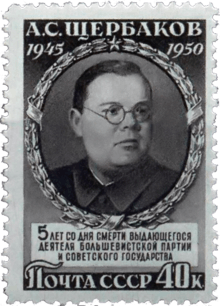Aleksandr Shcherbakov (politician)
Aleksandr Sergeyevich Shcherbakov (Russian: Алекса́ндр Серге́евич Щербако́в; 1901[1] – 10 May 1945) was a Soviet politician, statesman and a founding member of the Soviet Writers' Union, along with Maxim Gorky. Following the latter's death in 1936, Shcherbakov was transferred from his role as First Secretary to the lower role of Second Secretary of the Leningrad Regional Party Committee where he reported to Andrei Zhdanov. He was also a notable critic of Ivan Gronsky, the editor of the literary magazine Novy Mir between 1931 and 1937. He became First Secretary of the Moscow Regional Party Committee in 1938, a post he held until his death.[2]
Aleksandr Sergeyevich Shcherbakov Алекса́ндр Серге́евич Щербако́в | |
|---|---|
 | |
| First Secretary of the Moscow Regional Committee of the Communist Party | |
| In office 2 December 1938 – 10 May 1945 | |
| Preceded by | Aleksandr Ivanovich Ugarov |
| Succeeded by | Georgy Popov |
| First Secretary of the Moscow City Committee of the Communist Party | |
| In office 2 December 1938 – 10 May 1945 | |
| Preceded by | Aleksandr Ivanovich Ugarov |
| Succeeded by | Gorgy Popov |
| Candidate member of the 18th Politburo | |
| In office 21 February 1941 – 10 May 1945 | |
| Member of the 18th Secretariat | |
| In office 5 May 1941 – 10 May 1945 | |
| Member of the 18th Orgburo | |
| In office 22 March 1939 – 10 May 1945 | |
| Personal details | |
| Born | 27 September 1901 Ruza, Moscow Governorate, Russian Empire |
| Died | 10 May 1945 (aged 43) Moscow, Russian SFSR, Soviet Union |
| Resting place | Kremlin Wall Necropolis, Moscow |
During the German-Soviet War, Shcherbakov served as the head of the political directorate of the Red Army (with the rank of colonel general) in Moscow, and at the same time was director of the Soviet Information Bureau. According to Antony Beevor's book, Stalingrad, The Fateful Siege: 1942-1943, "One of the richest sources in the Russian Ministry of Defence central archive at Podolsk consists of the very detailed reports sent daily from the Stalingrad Front to Aleksandr Shcherbakov."
After suffering from years of alcoholism Shcherbakov died of heart failure on 10 May 1945, right after Victory Day, and the following year the town of Rybinsk was renamed Shcherbakov in his honour (its original name was restored in 1957).
In January 1953, Tass announced that his death was hastened by Jewish doctors. This was the beginning of the Doctors' plot.[3]
References
- Medvedev, Roy Aleksandrovich. "The Unknown Stalin" , 2005
- World Statesmen.org
- Rubentein, Joshua (31 May 2016). The Last Days of Stalin (Kindle ed.). Yale University Press).